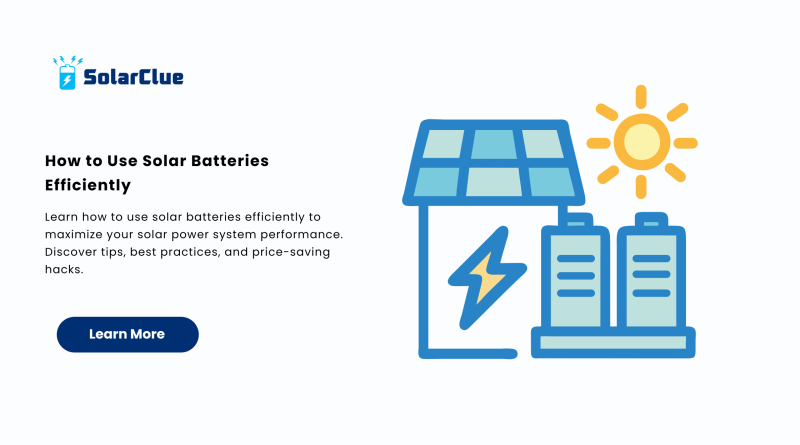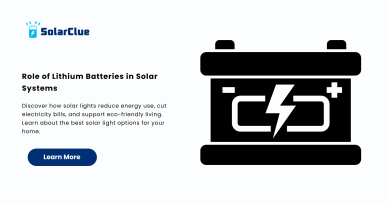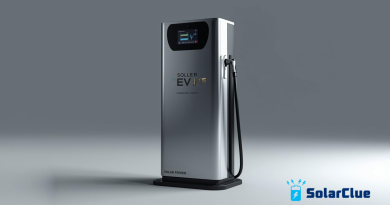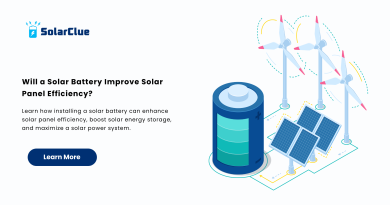How to Use Solar Batteries Efficiently
As the demand for renewable energy solutions grows, many households and businesses are turning to solar power systems. At the core of these systems lie solar batteries, crucial for storing energy generated by your panels. But to truly make the most out of your investment, it’s essential to know how to use solar batteries efficiently. In this blog, we’ll explore the best practices to maximize your battery life, performance, and cost-effectiveness while addressing the most common user concerns.
Table of Contents
- 1 Understanding Solar Batteries
- 2 Best Practices to Use Solar Batteries Efficiently
- 3 Choosing the Right Solar Battery
- 4 Evaluating Solar Battery Price
- 5 Benefits of Using Solar Batteries Wisely
- 6 Common Mistakes to Avoid
- 7 Advanced Tips for Maximizing Solar Battery Life
- 8 Solar Battery for Home – Is It Worth It?
- 9 Cost vs Value: Understanding Solar Battery Price
- 10 Solar Battery Maintenance Checklist
- 11 When to Replace a Solar Battery
- 12 Conclusion
- 13 FAQs
Understanding Solar Batteries
What is a Solar Battery?
A solar battery stores excess energy produced by your solar power setup for later use, especially when sunlight is unavailable. It helps reduce reliance on the grid and ensures a continuous power supply.
Types of Solar Batteries
- Lithium-ion Batteries: High efficiency, longer life.
- Lead-acid Batteries: Cost-effective but lower lifespan.
- Flow Batteries: Long lifespan, better for large-scale systems.
Why Solar Batteries Are Essential
They ensure energy independence, reduce utility bills, and support backup during outages. For home users, investing in a good solar battery for home use means enhanced control over your power usage.
Best Practices to Use Solar Batteries Efficiently
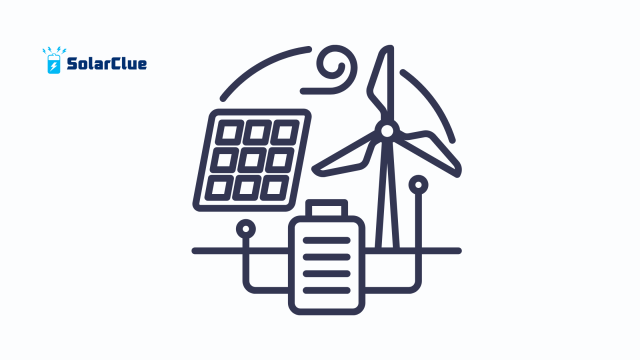
1. Avoid Deep Discharges
To prolong battery life, avoid letting it drain to 0%. Most solar batteries perform best when not discharged below 20%.
2. Optimal Charging Practices
Do not overcharge your solar battery. Ensure the charge controller is correctly calibrated to prevent overcharging, which can degrade battery capacity over time.
3. Regular Maintenance and Monitoring
Clean terminals, monitor for corrosion, and check system performance monthly. This extends the life of your solar power system.
4. Use Energy Strategically
Run major appliances during the day when the sun is up. This ensures minimal strain on the battery.
5. Keep Batteries Cool and Ventilated
High temperatures can reduce battery life. Store your solar batteries in a well-ventilated, shaded space.
Choosing the Right Solar Battery
Factors to Consider
- Battery Capacity (kWh)
- Depth of Discharge (DoD)
- Cycle Life
- Warranty
Evaluating Solar Battery Price
When assessing solar battery price, consider not just the upfront cost but also performance and longevity. A cheaper battery might have a shorter life, increasing long-term expenses.
Benefits of Using Solar Batteries Wisely
Energy Cost Savings
Efficient battery use cuts down electricity bills significantly.
Reduced Carbon Footprint
Using a solar power system with an optimized battery setup supports a greener lifestyle.
Increased Energy Independence
Properly used solar batteries provide security during grid failures.
Common Mistakes to Avoid
1. Ignoring Manufacturer Guidelines
Always follow brand-specific usage and maintenance instructions.
2. Oversizing or Undersizing the Battery
Choose the correct size based on your energy usage to avoid inefficiency.
3. Delaying Software Updates
Smart batteries come with apps or firmware. Update them regularly for improved performance.
Advanced Tips for Maximizing Solar Battery Life
Use Smart Load Controllers
These devices optimize energy distribution between your solar battery and appliances.
Invest in Battery Management Systems (BMS)
A BMS helps monitor and manage battery health automatically.
Regular Energy Audits
Assess your consumption patterns to better plan battery usage.
Solar Battery for Home – Is It Worth It?
Absolutely. A solar battery for home boosts energy efficiency, supports clean energy, and offers backup. Visit SolarClue to explore reliable home battery options.
Cost vs Value: Understanding Solar Battery Price
Short-term vs Long-term Investment
Higher solar battery price often means better efficiency and lifespan. Weigh the total value, not just the initial cost.
Incentives and Rebates
Government schemes often reduce the effective price of solar batteries. Check your local policies.
Solar Battery Maintenance Checklist
- Inspect connections monthly
- Check charge/discharge levels weekly
- Clean battery terminals quarterly
- Keep firmware up to date
When to Replace a Solar Battery
Signs It’s Time for a Change
- Reduced storage capacity
- Frequent malfunctions
- Longer charging times
You can get updated guidance at blog.solarclue.com.
Conclusion
Knowing how to use solar batteries efficiently is vital for maximizing your investment and achieving true energy independence. By following best practices, performing regular maintenance, and making smart energy choices, your solar power system can deliver reliable, long-term performance. Whether you’re investing in a new solar battery for home or trying to extend the life of your current one, informed usage makes all the difference.
To discover more insights, tools, and battery options, make sure you visit us at SolarClue – your smart step toward sustainable living!
FAQs
1. What is the best way to charge a solar battery?
Use a solar charge controller to avoid overcharging and ensure optimal power input.
2. How long do solar batteries last?
Typically 5 to 15 years, depending on type and usage.
3. Is it okay to leave a solar battery unused?
No, periodic usage and maintenance are required to maintain its health.
4. How do I know what size solar battery I need?
Analyze your daily power usage in kWh and match it to the battery’s capacity.
5. Can I add more solar batteries to my system later?
Yes, but ensure your inverter and charge controller support expansion.
Focus Keyphrase: How to Use Solar Batteries Efficiently

